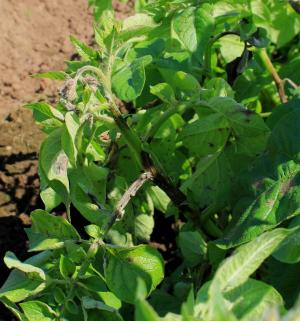AFBI potato blight warning
Date published:
The Agri-Food and Biosciences Institute (AFBI) and the College of Agriculture, Food and Rural Enterprise (CAFRE), Greenmount Campus, have issued the first potato blight warning for 2015. Full Infection Periods were recorded between 8th and 14th July at sites across Northern Ireland. The first field outbreak of blight in Northern Ireland this year was confirmed in a crop of King Edward near Coleraine on 15th July. Growers are advised to protect all crops with approved fungicides.

Potato late blight is a potato-rotting disease caused by a fungus-like plant pathogen called Phytophthora infestans, which remains the most devastating disease of potato world-wide, with the potential to cause extensive crop losses. Late blight is best known for the losses that resulted in the Irish potato famine of the 1840s, when over 1.5 million people died and the same number again emigrated as a result of severe failure of the primary crop. Today, the disease is generally well controlled by the application of fungicides. However, the disease remains a re-emerging problem, and still causes major epidemics, with occasional total crop losses recorded. Potato late blight can be extremely destructive as the fungal spores can spread on the wind to infect leaves, contaminate potato tubers in the soil and potentially destroy a crop in as little as 10 days.
Comber early potatoes, which have been granted protected geographical indication (PGI) status under European law, can be grown and harvested earlier than other potatoes in Northern Ireland because the climate and soil in Comber is warmer and drier. The potato varieties grown in Comber are therefore less likely to become infected by potato blight, not because of their genetics, but because the disease tends to be most prevalent in July and August, by which time the Comber potato has either already been harvested or is likely to be ready for harvest. However, it is important that potato late blight continues to be managed, because under certain weather conditions late blight can quickly spread if not properly controlled.
As the major source of potato late blight is infected potato seed tubers from the previous season, it is important that certified potato seed tubers are planted to eliminate sources of infection, and that plants which have survived from the previous season (known as volunteers) are properly controlled. Fungicide application timing and coverage are also important, as no matter how good the product, nothing makes up for a late start, stretched intervals or if areas are left unprotected. It is advisable that farmers start protecting their crop from potato blight either whenever the first blight warning is issued or when plants meet within the drills. It is also good practice to use a range of fungicides with different modes of action. This makes best use of their different types of activity and reduces the risk of selecting for blight strains resistant to any one fungicide.
Rapid changes often occur in P. infestans populations, sometimes leading to strains that are more aggressive or have reduced fungicide sensitivity. It is therefore extremely important to continue tracking populations of potato blight in N. Ireland, as regional populations are often quite different from those occurring elsewhere. AFBI researchers are currently part of an all-Ireland project called MonPESC (Monitoring Pathogen Evolution for Sustainable Cropping), which focuses on key crop diseases including blight, and is currently allowing this important population work to continue.
Potato late blight is favoured by high humidity, wet weather and moderate temperatures, and the risk is calculated throughout the season on the basis of weather data assessments from weather stations across N. Ireland. Blight warnings are issued by AFBI and CAFRE throughout the season in the farming press and via DARD Blight-Net Text Alerts. Blight-Net is active from early June and further information can be accessed from the DARD website at the link below.
www.dardni.gov.uk/topics/crops-and-horticulture/potatoes
If you would like to register for Text Alerts, contact Iain Johnston, CAFRE Crops Adviser, on 028 3752 9084 to register your number.
Notes to editors:
AFBI carries out high-quality technology research and development, statutory, analytical, and diagnostic testing functions for DARD and other Government departments, public bodies and commercial companies.AFBI's Vision is “Scientific excellence in Northern Ireland … serving the world”.All media enquiries to AFBI Press Office